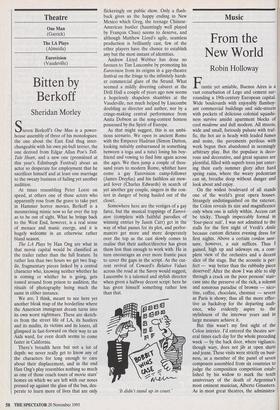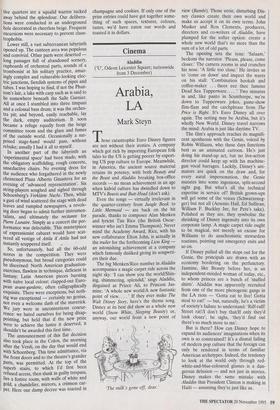Music
From the New World
Robin Holloway
Frantic yet amiable, Buenos Aires is a vast conurbation of Lego and cement sur- rounding a 19th-century European capital. Wide boulevards with enjoyably flamboy- ant commercial buildings and side-streets with pockets of delicious colonial squashi- ness survive amidst apartment blocks of cool moderne and dull modern. All streets, wide and small, furiously pulsate with traf- fic, the hot air is heady with leaded fumes and noise, the pavements perilous with work begun then abandoned in seemingly arbitrary play. But the populace is deco- rous and decorative, and great squares are plentiful, filled with superb trees just enter- ing their early summer glory after hard spring rains, where the weary pedestrian can sit, breathe deep without danger and look about and enjoy.
On the widest boulevard of all stands one of the world's great opera houses. Strangely undistinguished on the exterior, the Colon reveals its size and magnificence only when one is safely within. Access can be tricky. Though impeccably formal in lour-piece suit', I was not admitted to the stalls for the first night of Verdi's Attila because custom dictates evening dress for first nights. Above a certain cordon sani- taire, however, a suit suffices. Thus I gained, high up and sideways on, a com- plete view of the orchestra and a decent slice of the stage. But the acoustic is per- fect — way better than the rubbishy piece deserved! After the show I was able to slip through a crack on the poor persons' stair- case into the preserve of the rich, a solemn and sonorous paradise of browns — nico- tine, coffee, chocolate, chestnut — severe as Paris is showy; thus all the more effec- tive as backdrop for the departing audi- ence, who evidently aspire to the stylishness of the interwar years and in large measure achieve it.
But this wasn't my first sight of the Colon interior. I'd entered the theatre sev- eral times each day for the whole preceding week — by the back door, where vigilance, though wary, does not jib at open shirts and jeans. These visits were strictly on busi- ness, as a member of the panel of seven composers assembled from six countries to judge the composition competition estab- lished by his widow to mark the tenth anniversary of the death of Argentina's most eminent musician, Alberto Ginastera. As in most great theatres, the administra- tive quarters are a squalid warren tucked away behind the splendour. Our delibera- tions were conducted in an underground hole decorated in cheerless beige. Frequent excursions were necessary to prevent claus- trophobia.
Lower still, a vast subterranean labyrinth opened up. The canteen area was populous and convivial. Other parts were deserted long passages full of abandoned scenery, cupboards of orchestral parts, sounds of a trombonist at his solitary practice, amaz- ingly complex and vulnerable-looking elec- tric junctions, fiendish systems of pipes and tubes. I was hoping to find, if not the Phan- tom's lair, a lake with carp such as is said to lie somewhere beneath the Salle Gamier. All at once I stumbled into three timpani and a colossal bass drum; it was the orches- tra pit; and beyond, easily reachable, lay the dark, empty auditorium. It soon became a refuge equally from the beige committee room and the glare and fumes of the outside world. Occasionally a sur- prised stage-hand would pass, without rebuke; usually I had it all to myself. In another part of the labyrinth an `experimental space' had been made, with the obligatory scaffolding, rough concrete, unseductive chairs. No evening dress for the audience who forgathered in the newly christened Plaza Alberto Ginastera for an evening of 'advanced representation'. Six string-players soughed and sighed through Schoenberg's Verkliirte Nacht. Then, while a gust of wind scattered the stage with dead leaves and rumpled newspapers, a revolv- ing door began to admit further instrumen- talists, and ultimately the recitante for Pierre Lunaire. Simply as a concert the per- formance was delectable. This masterpiece of expressionist cabaret would have scat- tered all vestige of Attila if Attila had not instantly scuppered itself. So, unfortunately, had all the 60-odd scores in the competition. They were pseudonymous, but broad categories could be discerned: North American graduation- exercises, flawless in technique, deficient in fantasy; Latin American pieces bursting with naive local colour; clapped-out Euro- pean avant-garderie, often calligraphically exquisite. There were exceptions, but noth- ing was exceptional — certainly no genius, not even a welcome dash of the maverick. We jury were in uncontentious concur- rence: we hated ourselves for being disap- pointing, but held that if the new prize were to achieve the lustre it deserved, it shouldn't be awarded this first time.
The announcement of this flat decision also took place in the Colon, the morning after the Verdi, on the day that would end with Schoenberg. This time admittance, via the front doors and to the theatre's grander parts, was permitted. At the top of the superb stairs, to which I'd first been refused access, then slunk in guilty trespass, lies a festive room, with walls of white and gold, a chandelier, mirrors, a crimson car- pet. Here our damp decree was toasted in champagne and cookies. If only one of the prize entries could have got together some- thing of such spaces, textures, colours, tastes, we'd have eaten our words and toasted it in dollars.











































































 Previous page
Previous page